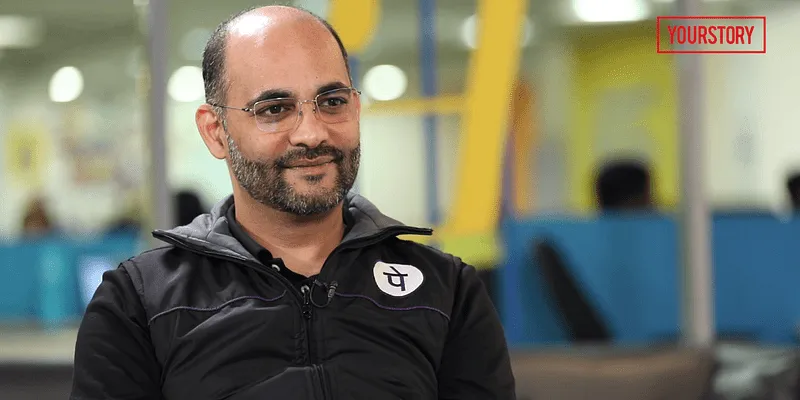[Matrix Moments] From Flipkart to building one of India’s largest payment startups: Sameer Nigam recalls PhonePe journey
In this week’s Matrix Moments, Vikram Vaidyanathan, Managing Director, Matrix Partners India, talks to Sameer Nigam, Co-founder and CEO of PhonePe, on the initial days of building the digital payments startup and why the the co-founders decided to put technology first.
PhonePe is one of the largest digital payments players in the country. As of March this year, it had 15 million merchants on its platform, which it looks to scale to 25 million by the end of the year.
In a conversation with Vikram Vaidyanathan, Managing Director, Matrix Partners India, Sameer Nigam, Co-founder and CEO, PhonePe, spoke about the journey of the digital payments startup. Founded in 2015 by Sameer and Rahul Chari, it all started in 2013-14 on one floor in Flipkart.
“The Flipkart floor was run by you, Rahul, Mukesh (Bansal), Ankit (Nagori), Sujeeth Kumar, and Amod Malviya (Founders of Udaan). There was so much talent; each one has gone on to lead huge companies. What made it special?” Vikram begins.
Sameer attests that it was one of the most exciting parts of his career, adding that anyone who was there in those days found it equal parts heady, equal parts stressful because Flipkart was really "a bunch of sharp young people who came together".

Sameer Nigam, Founder and CEO, PhonePe
From music to ecommerce
“It started with Sachin (Bansal) and Binny (Bansal), who were on an open-ended mission. Rahul and I were working in a small startup in Mumbai in the music industry, and had learnt the hard way that you don’t make money in the music industry easily,” Sameer says.
But they met the Flipkart early team, and the deal was done within half a day for the first startup.
“We were really just an excited bunch of folks that were putting customer and technology first, and everything else would follow. They literally didn’t have a business plan, I think most of the leadership team honestly didn’t even know what a P&L looked like at that point,” Sameer says.
Citing an anecdote, Sameer says that when he met Binny the first time there was a rumour that Amazon might be buying Flipkart for $700-$800 million.
“So when we asked him about whether they’re likely to sell, his response was: ‘ I’m in my mid-twenties. By the time I’m done, people should be asking us if we’re buying Amazon. That’s the way I want to think about this.
"Then we met Sachin again in 2010-11 and he spent half an hour on a whiteboard walking Burzin, Rahul, and myself, three-four founders, through his argument for why ecommerce would be a $25-$30 billion business by 2020. This was in 2011,” Sameer recalls.
Donning multiple hats
This thinking of a large market shaped a lot of the decisions at PhonePe in the early days.
“The one thing that struck me about that time was all of you guys with Flipkart at that time played so many roles - growth, engineering, product, etc. What made that work and how did it shape each of you guys?” Vikram asks.
Sameer explains that just exposure at that scale “when you’re growing 10x over a four-five year window” helped all the people involved.
“I think everyone becomes a much more seasoned entrepreneur [because] you’re basically playing every function…you’re a lawyer and a marketer, a copywriter, and a coder. So it helped a lot of us. I think why it worked well was if you see that team, one level below Sachin and Binny, a lot of the folks had a strong tech background or business background, or both,” Sameer says.
He adds that it was the right combination of mixed roles. The people were so young that they didn’t know better and just said ‘we’re just going to make it happen’. The IITians were very analytically sharp.
“Whether they were in tech functions like Amod or whether they were people like Sujeet or on the business side. I think we felt comfortable saying this is the biggest set of problems we solved over the next 12 or 18 months because the founders put trust in the leadership team, saying we’ll put the smartest people available at this point of time on those problems,” Sameer says.
Starting up again
Starting up again was just “an automatic choice”. Sameer explains that you can take a lot of the strategic thought process and trust for granted “when there is a team of people you already know”.
“With my eyes closed, if there’s anything that we need to take a call on, on any aspects - how do we treat employees, how do we treat partners, what kind of company are we going to build, and whether it’s going to be technology-led or not - I think having the luxury of having three founders where anyone can answer that on behalf of the others is huge,” Sameer says.
The Flipkart stint helped the founders identify much larger markets.
“One learning in the music industry was if the size of the pie is big enough, you can meander around and strike gold. The second was we’re much better at building large-scale platforms, and we enjoyed a lot more as technologists, building large-scale, massy, and high-social impact platforms that ensured great experiences,” Sameer says.
“When we decided to move on from Flipkart and start over, we were very clear that we want to build something that has technology not as the enabling function, but as the reason for existence.”
Thus, the initial team of starting PhonePe was “just there”.
“We’d gone through adversity, we’d gone through upsides, we knew where the DNA match and the comfort level were the highest. But I felt that for what we wanted to do next I wanted pure play technologists at the helm. So that was the founding team.”
Listen to the podcast here.
Edited by Teja Lele


![[Matrix Moments] From Flipkart to building one of India’s largest payment startups: Sameer Nigam recalls PhonePe journey](https://images.yourstory.com/cs/2/a9efa9c02dd911e9adc52d913c55075e/Imagep6oe-1625895360881.jpg?mode=crop&crop=faces&ar=2%3A1&format=auto&w=1920&q=75)

![[Matrix Moments] Asish Mohapatra’s journey from being an investor to building a fintech startup at scale](https://images.yourstory.com/cs/2/a9efa9c02dd911e9adc52d913c55075e/Imageakb5-1594439822674.jpg?fm=png&auto=format&h=100&w=100&crop=entropy&fit=crop)




